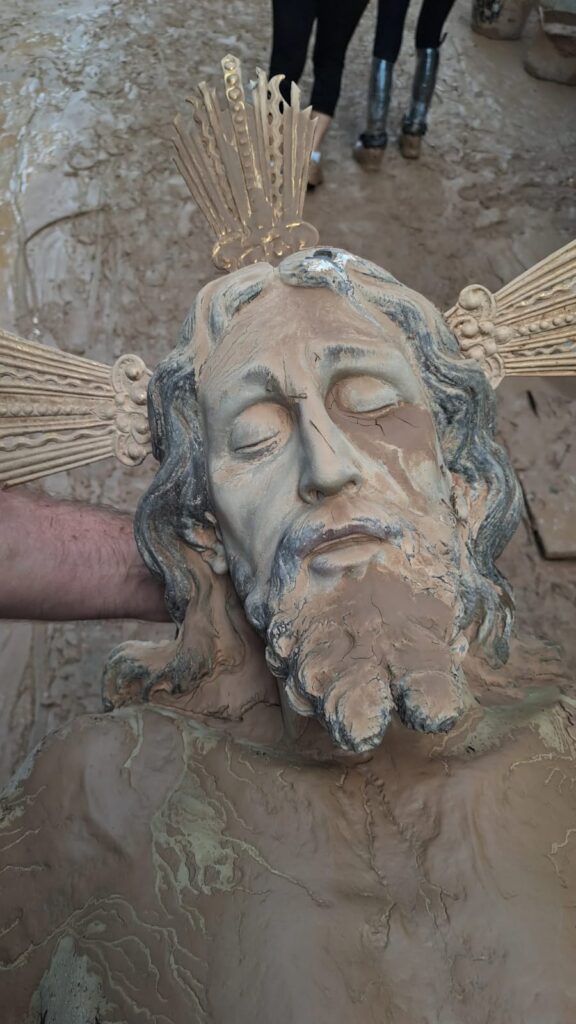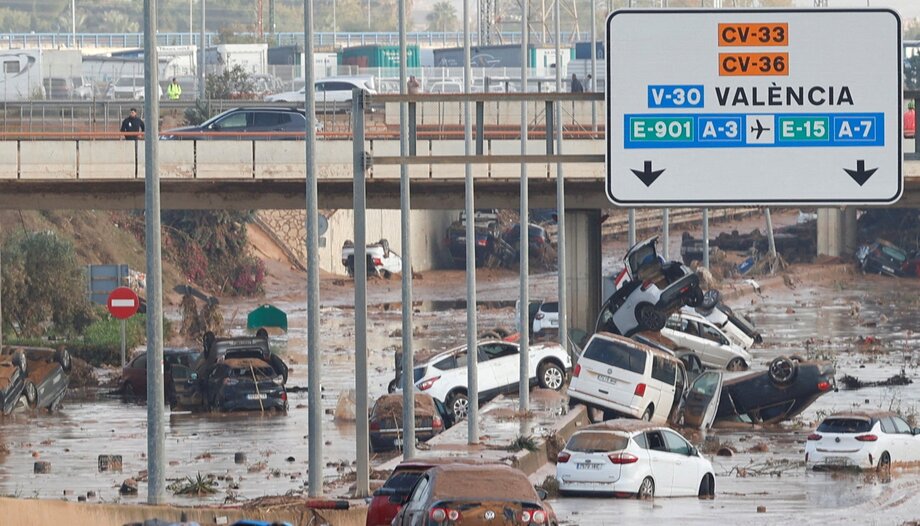Today I have seen you, Lord, muddy and dead, drowned under the mire of PaiportaAnd I wanted to ask you why. Why, Lord? Why?

Looking for an answer in the Psalms, I have asked you: Where were you while the clouds discharged their waters, the storm clouds rumbled and your arrows zigzagged? Where were you while deadly waves surrounded us, when destructive torrents terrified us, when the nets of the abyss enveloped us and the snares of death reached us?
Are you only of the same clay that covers you and you neither feel nor suffer? Are you one of those beings of dust that cannot save; that breathe out the spirit and return to dust? One of those idols of the Gentiles that are of gold and silver, the work of human hands, that have mouths and do not speak, that have eyes and do not see, that have ears and do not hear, and there is no breath in their mouths?
Some have laughed at you, and at me for trusting in you. Why do you forget me? Why do I go about, gloomy, harassed by my enemy? My bones are broken by the taunts of the adversary; all day long they ask me, "Where is your God?" You have made us the scorn of our neighbors, derision and derision of those around us; you have made us the proverb of the Gentiles, the nations grimace at us.
Good Friday
While I was still trying to find an answer to these questions, I took a good look at your photo, and at those golden rays, although also muddy, that come out of your head. The experts in sacred art say that they are called potencies and that they want to express, not so much your divinity, but your highest degree of humanity. They say that you, true man, the human being par excellence, mastered to the highest degree the three human powers (understanding, memory and will) to obey the command of the Father and accept, for us, the scourging; for us, the crown of thorns; for us, the mockery and scorn; for us, the cross; and, now, also for us, the flood.
To see you full of mud is to contemplate your body again in the tomb, half-washed because the Sabbath came upon the women that Good Friday. While we weep in fear, you are descending into the hells of every human being, rescuing the dead for eternal life, becoming in solidarity with every victim of the flood, but also with all those swept away by the torrents of life, by the waves of illness or disability, by the rough waters of contempt and discarding, by the violent flow of precariousness, fear and uncertainty.
Your photo is an embrace to every victim, to every person who has lost a loved one, to those who have lost their home, and to those of us who have lost even hope. It is an embrace that tells us: "I am here, I have not left you for a second, I was with you that day and I will continue to be with you every day of your life, because I can do nothing but love you to the point of giving my life. Count on me if you have to get muddy, count on me if you are suffering, grab my hand if you are dragged by the current, I will not let go, even if we have to drown together".
Lord of the mud of Paiporta
Today I have seen you, Lord, muddy, and I have remembered that you made us out of mud. You molded us, but we were inert beings until you breathed into our nostrils your spirit of life. Today we are also like the dead, dejected by misfortune, stunned by the whirlwind, and therefore we need your breath again. Inflame us, Lord of the mud of Paiporta, with your spirit of life.
Today I have seen you, Lord, muddy, next to the muddy feet of two people passing by you on a ground full of footprints. And I have seen in them the tired feet of our fathers, the Israelites in Egypt, treading the mud to make bricks for Pharaoh. And I have remembered how many Pharaohs want to take advantage of the misfortune of many for their own interest. Enable, O Lord of the mud of Paiporta, our leaders, like Moses, to keep the people together and put themselves at their service, to open the waters for us and lead us, with bare feet, to live in peace in a land flowing with milk and honey for all.
Muddy Christ
Today I have seen you, O muddy Lord, supported by an anonymous arm, one of so many who these days, inside and outside your Church, work to bring the people forward. And I have seen, in that arm, the arm of the potter to whose workshop Jeremiah went down and who taught him that, out of evil, you can make good come forth. From a clay pot bent by the potter's wheel, if it is remolded, you can bring forth a most beautiful one. Help us, Lord of the clay of Paiporta, to rebuild our wounded hearts, our broken families, our destroyed villages and our flooded homes.
Today I have seen you, O muddy Lord, and I have looked especially into your eyes. And I have seen in them those of the man born blind that you smeared with mud so that he could recover his sight. Help us, Lord of the mud of Paiporta, to open the eyes of faith to be able to see the mystery of your love in the midst of this tragedy that seems, only seems, to have no sense.
Today I saw you, muddy Lord, and I finally noticed the wink you are giving us with your right eye. I don't know if it is the intention of the artist who painted you or if it is just a casual effect of the mud, but it seems that your pupil wants to open its way between the eyelids. Are you mocking death? Are you about to say that this is just a step towards life? Help us, Lord of the mud of Paiporta, to see you as an announcement of the Resurrection, not to lose hope that we will rise again, not to doubt that you are with us in this story, that, from death and mud, you bring life. You help us, because you know that we carry this treasure in fragile clay pots, clay of Paiporta.
Journalist. Graduate in Communication Sciences and Bachelor in Religious Sciences. He works in the Diocesan Delegation of Media in Malaga. His numerous "threads" on Twitter about faith and daily life have a great popularity.







